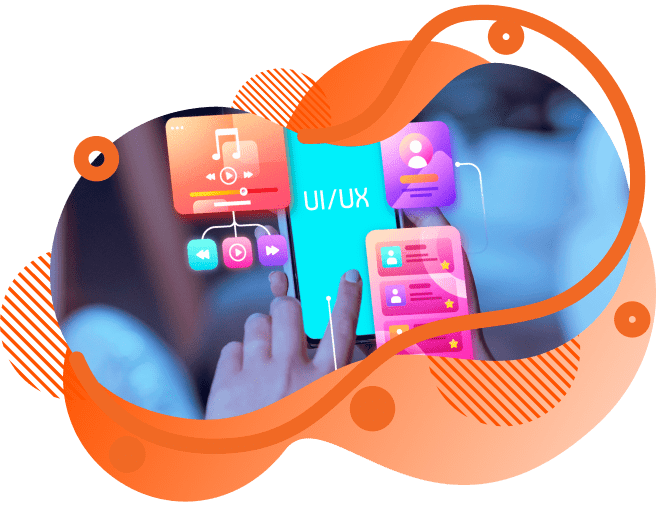mobile development Services
Vervelo offers safe, secure, and scalable Mobile App Development Services. We develop the ideal mobile app from scratch or carefully redesign your existing mobile app with configurable features, integrations, and upgrades. Our mobile application developers are skilled in developing custom-built Android, iOS, and Windows mobile apps. We build custom-tailored features for all business niches at reasonable prices.

Mobile Development Services
We provide state-of-the-art mobile app development services customized to meet your company’s requirements. Our skilled developers create safe, scalable, and high-performing mobile apps to help you stay ahead in the digital world, whether you need native, cross-platform, or hybrid applications.
Custom Mobile App Development
We design and develop feature-rich mobile applications that align with your business goals, target audience, and industry trends.
Cross-Platform Development
We use advanced frameworks like Flutter, React Native, and Xamarin to build cross-platform apps that run smoothly on both iOS and Android while reducing development costs.
UI/UX Design for Mobile Apps
We focus on user experience and intuitive design to ensure your app is visually appealing, easy to navigate, and highly engaging.
API Development & Third-Party Integrations
Integrate your app with payment gateways, cloud services, CRM/ERP solutions, AI-based tools, IoT devices, and more.
Native App Development (iOS & Android)
- iOS App Development – Leveraging Swift & Objective-C for seamless Apple ecosystem integration.
- Android App Development – Using Kotlin & Java to create powerful and optimized Android applications.
Hybrid Mobile App Development
Develop hybrid apps using technologies like Ionic, Cordova, and PhoneGap to ensure flexibility and compatibility across multiple platforms.
App Modernization & Migration
Upgrade outdated mobile applications by migrating to modern frameworks, improving performance, and enhancing security.
Mobile App Maintenance & Support
We provide regular updates, performance monitoring, bug fixes, and feature enhancements to ensure long-term app stability.
Software Testing Services
There are two types of Software Testing: Functional and Non-functional Testing.
Functional Testing
Functional testing is a type of testing that seeks to establish whether each application feature performs as per the project’s specifications. Functional testing is involved with functional specifications or business needs. This testing is crucial for determining the quality and functioning of the program. Each function’s output is compared to the relevant condition to see whether it meets the end user’s expectations.
Non-Functional Testing
Non-Functional testing is concerned with the application’s performance. Non-functional testing is just as vital as functional testing. Functional testing is essential because no one wants to use an application that isn’t scalable or secure or can’t manage many DB transactions simultaneously. As a result, during Non-Functional testing, the application’s performance in several areas is evaluated.
Functional Testing Includes
1. Unit Testing
The developer frequently tests the most basic unit of an application to check that a minor testable code is working correctly. A White Box testing approach appears at the bottom of the V-Model, indicating that it is the initial software testing performed in SDLC.
2. Integration Testing
When two or more software components or units are integrated, they must communicate through instructions, data exchange, or DB calls. Integration testing is conducted on them as a single cluster to ensure the intended interaction occurs.
3. Interface Testing
The accuracy of data interchange or transfer between two components is tested in Interface testing, which falls under Integration testing.
4. System Testing
System testing combines the application’s components and the entire system as a single entity.
5. Regressionn Testing
The code is adjusted whenever there are code repairs or feature enhancements. Regression testing ensures that the code modifications have not introduced any new problems. At the same time, the previously working functionality is still intact and functional.
6. smoke testing
When developers deploy an application, the testing team does Smoke testing to ensure that all end-to-end features are operating. If a fresh build breaks any key functionality, the build is rejected and resent to developers. It is done to confirm that the new code modifications have not damaged any vital function.
7. sanity testing
It is often a subset of Regression tests. It is done whenever a new build of a stable application is delivered. After passing the Sanity test suite, the build is advanced to the next testing step.
non-Functional Testing Includes
1. performance testing
The application’s performance is evaluated when it is subjected to real-world settings. Performance characteristics like response time, scalability, stability, and resource utilization efficiency are monitored. Hence, it is beneficial in determining when the application would decline. It will enhance the application design or architecture to assure dependability and fast response time.
2. stress testing
Stress testing involves subjecting the application to abnormal situations that would not occur under standard settings. The application’s load is escalated to the point where it fails, and its behavior is recorded. This testing addresses the following topics: How does the system perform under stressful conditions? Will it be able to recover if it crashes? And restart?
3. volume testing
Volume testing determines how well the system performs when the database handles a significant volume of data or data processes. Is the database capable of storing and processing large amounts of data? Will there be a problem as a result of the massive data volume?
4. load testing
Load testing examines the application’s performance under predicted load in the real world. The application is subjected to all potential loads, and its performance is evaluated.
5. security testing
The application’s security is examined from the network, data, system, and application standpoints. Any individual who is not authorized should not be able to access the application or any private data. This testing assures the application’s dependability and credibility among customers. Security testing is a form of penetration testing.
6. scalability testing
Will the architecture and design allow the application to be scalable in the future? For example, will our program allow us to add servers and have more database transactions? Will it increase user traffic in the future? All these are tested as part of the application’s scalability testing.
7. usability testing
Concerns about the system’s usability from the standpoint of the user. Is the user able to utilize the application without assistance? Can the user remember the application the next time he sees it without assistance or problem? How effectively can a user utilize the system? All of these questions are addressed through usability testing.
8. maintenance testing
Maintainability testing is vital since designing an application is one thing, and maintaining the application for possible upgrades is another. Maintainability testing examines how effectively the application accommodates modifications and updates to the code or system.
9. compatibility testing
The application’s compatibility with various operating systems, browsers, hardware, network capacity, devices, and so on is checked. The application should function successfully in the customer’s prioritized environments.
Do you want to battle-test your software with our Quality Engineering team?
Excellent Testing Software QA Services Delivered By Vervelo Team
No shortCode found
Industries Our Quality Assurance Team Expert In

Healthcare
Development of HIPAA-Compliant EHR, EMR, Telehealth Platform & Practice Management System (PMS). Have Experience in FHIR, HL7, SMART on FHIR, CCDA, and Integration expertise in third-party EHR solutions.

Retail & E-commerce
End to End tailored made ERP System for Retail & e-Commerce, Supply chain & Inventory Management Systems. We developed POS Applications, PLM, EDI, Shop Floor Control, B2B e-Commerce, and Omnichannel Commerce.

Software & Hi-Tech
We develop innovative and creative next-generation custom software solutions as per requirements. We partner with ISVs for technology consulting, core engineering, and full-scale integration capabilities.
Software Testing Technologies & In Frameworks We are Experts
Scripting languages
Java
Kotlin

Python
WebdriverJS
C#
Software Testing Process
The software development team at Vervelo takes a deliberate approach to complete each software testing process for our valuable customers. We employ a variety of operating models, and we let the client select the one that best suits their company.
development Plan
Before developing a Verification, Validation, and Testing Plan to assess the established software solution, testers question the completeness and accuracy of the event plan. Testers evaluate the number of resources required to test the developed software.
Develop Test Plan
Forming a testing strategy will follow the same pattern as any other software planning process. The framework of all the testing plans is the same, but the content will vary according to the level of risk testers see.
Test Software Design
This stage primarily uses verification techniques to evaluate the external and internal design. The testers are concerned that the planning will meet the desired goals. Ensuring the design will be effective and efficient on the defined hardware.
Build Phase Testing
The process used to generate software from an internal design document will define the number and kind of testers required. This phase will need less testing as the construction becomes more automated. However, if the software is developed using the waterfall technique, it is prone to mistakes and must be checked.
Execute
It means testing code in constant motion. These methods confirm the executable code, which matches the specified software requirements and hence the structural specifications of the design.
Acceptance Test
Acceptance testing allows users to assess the suitability and utility of software in carrying out their day-to-day work responsibilities. This compares what the user feels software should do to what the stated requirements specify software should accomplish.
Report Test Results
Reporting test results is an ongoing task. It might be either verbal or written. Bugs are reported to the appropriate parties as soon as possible to make fixes at the lowest possible cost.
Software installation
After the test team clarifies that the software is ready for production, testers test the software in a production environment. This test examines how operating software, linked software, and operating processes interact.
Test Software Changes
The test strategy must change when requirements change, and the effect on software systems must be tested and evaluated.
Evaluate test effectiveness
Testing improvement can best be achieved by evaluating effectiveness at the top of every software test assignment. While testers primarily perform this assessment, it involves developers, software users, and quality assurance professionals.
Do you want to battle-test your software with our Quality Engineering team?
Why Vervelo is The Best Software and QA Testing Services Company?
Vervelo has delivered end-to-end QA services to organizations for over 9+ years. We are a top software testing company with 200+ QA specialists onboard to ensure that your futuristic apps provide a smooth user experience. We have a proven track record of successful projects delivered within the project timeline.
Choose an Engagement Model for Hiring Software Tester

Time & material model
This model is suitable for projects where requirements are constantly evolving or need to be clarified. You will need to provide the project’s initial scope, and then we can create a phased plan based on it. You can change requirements based on the fact that we can update milestones. You will be paying for the amount of work done.

Dedicated Team
This model is used for engagement, where you must extend the team with remote resources. You will need to provide all the necessary skills required for resources. We provide the best matching resources profile based on requirements. We allow customers to take interviews based on requirements or a two-week trial period to check resource skillsets & expertise. Payment will be on per hour basis.

Fixed Price model
End to End tailored made ERP System for Retail & e-Commerce, Supply chain & Inventory Management Systems. We developed POS Applications, PLM, EDI, Shop Floor Control, B2B e-Commerce, and Omnichannel Commerce.
Frequently Ask Questions